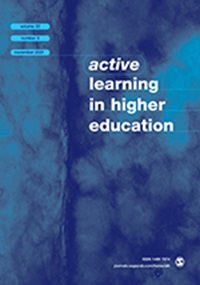Contribution of peer-feedback to the development of teamwork skills
IF 3.8
1区 教育学
Q1 EDUCATION & EDUCATIONAL RESEARCH
引用次数: 0
Abstract
Peer-feedback is a widely-used strategy at the university level for its positive impact on student learning and its multifaceted advantages encompassing social, cognitive, and metacognitive development. However, few studies have assessed its contribution to the development of teamwork skills. This study analyzes students’ perception of how peer-feedback contributes to the development of teamwork skills by comparing the results of two class groups that have taken the same subject, though with different feedback experience designs (face-to-face and mixed feedback vs. non-face-to-face and written feedback, with or without consensus among group members). At the end of the study, 82 participants completed a questionnaire to assess their perception of the peer-feedback experience and its impact on learning and the development of teamwork skills. The findings reveal that students perceive that giving and receiving feedback in face-to-face mixed modality contributes more to developing teamwork skills; however, the presence or absence of consensus among group members to give or receive feedback does not appear to exert a clear impact on the development of these skills. Additionally, the findings suggest that students perceive a greater development of teamwork skills by giving feedback rather than receiving it. These results highlight the importance for teachers to consider such aspects when designing peer-feedback experiences, aiming to maximize the impact on the development of teamwork skills.同伴反馈对培养团队合作技能的贡献
同伴反馈对学生的学习有积极影响,并具有包括社会、认知和元认知发展在内的多方面优势,因此是大学阶段广泛使用的一种策略。然而,很少有研究对其对团队合作技能发展的贡献进行评估。本研究分析了学生对同伴反馈如何促进团队合作能力发展的看法,比较了两个班级小组在学习同一科目时的反馈体验设计(面对面和混合反馈与非面对面和书面反馈,小组成员是否达成共识)。研究结束时,82 名参与者填写了一份问卷,以评估他们对同伴反馈体验的看法及其对学习和团队合作技能发展的影响。研究结果显示,学生认为以面对面的混合方式给予和接受反馈更有助于培养团队合作技能;然而,小组成员之间是否就给予或接受反馈达成共识似乎对这些技能的培养没有明显影响。此外,研究结果表明,学生认为给予反馈比接受反馈更能培养团队合作能力。这些结果凸显了教师在设计同伴反馈体验时考虑这些方面的重要性,目的是最大限度地促进团队合作技能的发展。
本文章由计算机程序翻译,如有差异,请以英文原文为准。
求助全文
约1分钟内获得全文
求助全文
来源期刊

Active Learning in Higher Education
EDUCATION & EDUCATIONAL RESEARCH-
CiteScore
13.20
自引率
12.00%
发文量
31
期刊介绍:
Active Learning in Higher Education is an international, refereed publication for all those who teach and support learning in higher education (HE) and those who undertake or use research into effective learning, teaching and assessment in universities and colleges. The journal is devoted to publishing accounts of research covering all aspects of learning and teaching concerning adults in higher education. Non-discipline specific and non-context/country specific in nature, it comprises accounts of research across all areas of the curriculum; accounts which are relevant to faculty and others involved in learning and teaching in all disciplines, in all countries.
 求助内容:
求助内容: 应助结果提醒方式:
应助结果提醒方式:


